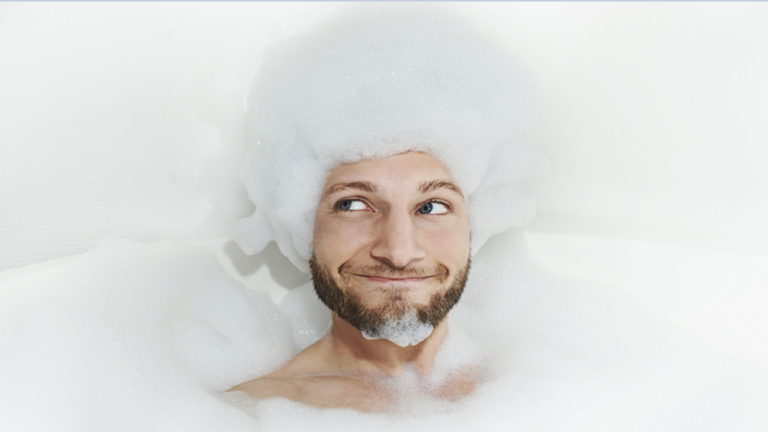Many depend on the choice of shower liquid to smell it, and although this may be attractive, it is not a wise decision for the skin.
Nada Ward, founder of Beauty Kin, warned that there were "many ingredients" in daily body lotion that could be "harmful." "It is very important to make sure that you are aware of exactly what is in the products you use for washing," she said.
- She drew attention to "alarming ingredients"
- whose presence should be cautious, such as sulphates.
She explained :
"Sulfates are commonly used as a foam agent when you put the product on your skin. Unfortunately, sulfates are actually not good for your skin at all. Sulphate is a very common irritant of the skin, and people with sensitive skin are more susceptible to irritation than this ingredient ".
- Thus, the use of sulfate-containing products can lead to dry skin, cracking, itching, and pain.
- Another element to pay attention to in these products is triclosan, which is fairly common in soap and body lotion.
- According to Lord's, "studies have found that excessive exposure to triclosan is associated with the reduction of certain hormones produced by the thyroid."
Furthermore, research suggests that triclosan "can harm bowel health."
- This conclusion was drawn from an animal study, where an association between triclosan and colitis was found within mice.
- Ward warned of phthalates that have to do with hormonal imbalances within the body.
- "These hormonal imbalances have also been linked to the potential to cause reproductive and fertility problems later in life," she said.
Attention should also be paid to the presence of paraben, a preservative that extended the product's shelf life. Parabens can interfere with hormones in the body, which may lead to skin sensitivity.
She revealed: "In some cases, this may eventually lead to allergic and irritant interactions. But paraben is not only harmful to the skin, it also has the potential to cause long-term damage under the surface of the skin, where studies have shown that there is a link between some parabens that raise the level of cellular damage, linking it to skin cancer. "
What shower or soap liquid should I use?
- Rose recommends selecting products containing natural ingredients. According to industry experts
- sulfates can be - for example - dried for sensitive skin
- but they are considered safe.
Unilever noted that triclosan - which is used at a maximum concentration of 0.3% in body soap and gels - is safe.
Expert reveals mistake we make in the shower may be causing hair loss
Bathing is an essential part of the daily routine of many, and can serve as a body and mind disinfectant, a way to relax and rest.
Although bathing brings multiple physical and psychological benefits, one expert said that the way we bathe may actually cause hair loss.
Sam Sincker, CEO of Este Medical Group, said people who bathe in hot water are most at risk of damaging their tresses.
This is due to the effect of hot water on blood flow and the overall health of hair. Noting: "Most people like to shower with hot water before or after a long day. This can help us relax, but bathing with very hot water can cause a lot of damage to skin and hair. hot water slows blood flow, while the scalp needs good turnover to encourage healthy hair growth. "
- The hair expert explained that steam showers can make hair more fragile and prone to fracture, which in turn leads to hair loss.
- This, he said, "Because when you have hot water on your scalp, it opens the pores, which makes your hair roots weaker and allows it to come out easily."
- "Washing with warm water will open your pores enough to clean your roots and scalp but not enough to cause hair damage and loss."
But not only hair loss is what hot showers can cause, and if you suffer from dandruff, you may want to lower the temperature.
Sinker explained that scalp inflammation, where skin tissue is damaged on your head and becomes inflamed and irritated, can exacerbate hair loss because it hampers the skin's ability to absorb oxygen and nutrients that your scalp needs to maintain healthy hair.
He continued:
"Using water at such a high temperature that it harms your scalp can not only be disturbing, but can lead to severe skin dryness that causes dandruff. Dandruff may be a common hair concern, it is not pleasant for anyone who suffers and is best avoided wherever possible. "
When it comes to washing hair in general, Sinker said that bathing with very hot water can dry hair, making it curly and difficult to control.
He added: "It can also strip your hair of its natural oils, and your body will replace those oils, making your hair become greasy faster."
Sinker is advised to shower with warm water and then rinse the hair with cold water. He added: "There are many benefits to rinsing with cold water, including improving blood circulation, preserving natural oils and maintaining a smooth texture through moisture trapping."


Comments
Post a Comment